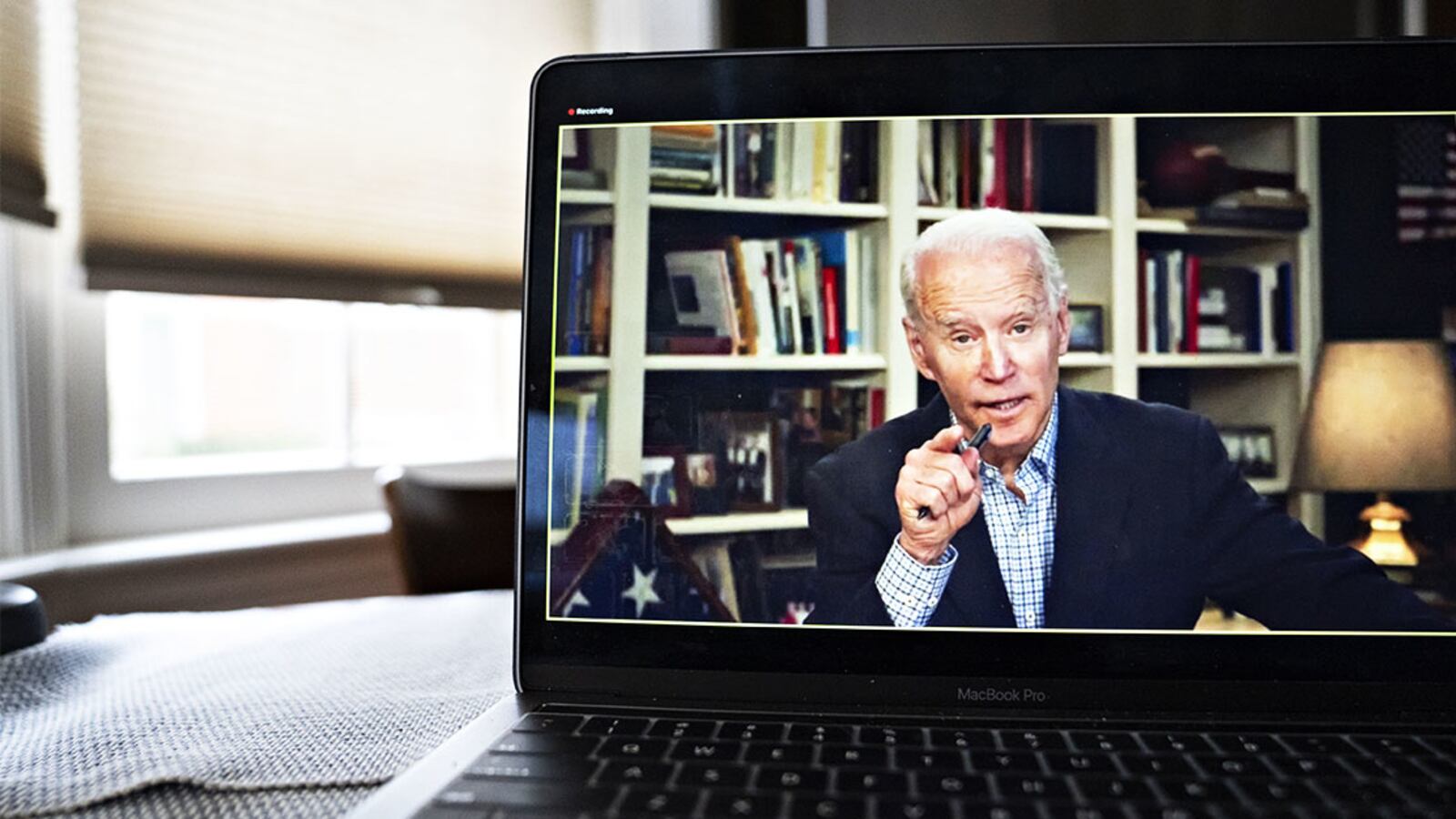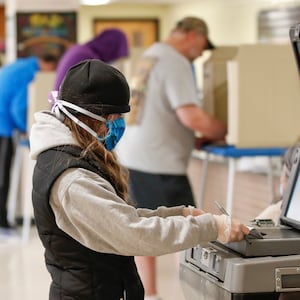Presumptive Democratic nominee Joe Biden, his senior advisers, and his expanding network of battleground operatives are in agreement that Wisconsin is a key part of capturing the White House from President Donald Trump.
On paper, Biden’s two Wednesday events—a roundtable in La Crosse and rally in Milwaukee—are ostensibly no different than other virtual destinations he has zoomed into from his home in Wilmington, Delaware. But Democrats said the critical nature of the location, where the party will host its convention in August, and his campaign’s newly announced digital advancements, will place a particular spotlight on Biden in the state.
“When Vice President Biden visits Wisconsin tomorrow, he'll be entering a state where communities of color, minority owned businesses and rural economies have paid the price of President Trump's failed response on COVID-19,” said Julia Krieger, the Biden campaign’s regional communications director. “Battleground states like Wisconsin know who Donald Trump is -- and in November, they'll remember how he left them behind while Joe Biden fought for them in times of crisis.”
Ahead of the August convention, the prospect of digital glitches are still high on the minds of party strategists and activists eager to form contingency plans in the event that an in-person event has to be modified or nixed all together. Less than four months ago, a technological meltdown caused near-universal panic among Democrats during the Iowa caucus, where the expectation of a clear sense of where the party was going devolved into days of confusion.
“I'm hopeful that we're going to be able to have some form of an in-person convention,” DNC chairman Tom Perez said in a cable news appearance on Sunday, adding that he is looking forward to “highlighting” Biden.
But the reality on the ground is more fluid. Wisconsin has become one of the top political flashpoints of the pandemic era, opening up the possibility of even stronger than expected partisan tensions to spill over into November.
In early April, some Democrats feared that sending people to the polls for the state’s primary could cause people to get sick, and possibly die, due to the coronavirus. An attempt by the state’s Democratic governor to delay the election failed as Republican legislative leaders pushed to keep the election on schedule.
That contest, which saw Biden defeat Sen. Bernie Sanders (I-VT), also included a state supreme court race where Democrats were hoping to unseat a conservative justice. That led Trump to attack Democrats’ effort to delay the election, as he spent a coronavirus task force briefing on primary night boosting false allegations of widespread fraud when it came to mail in voting.
While Sanders called for the state’s primary to be delayed a little under a week from the planned voting date, Biden skipped taking such a clear stance despite persistent safety concerns from local Democrats.
After Democrats’ preferred choice wound up winning the state supreme court seat, relations in the state continued to be tense. Last week, a challenge from GOP leaders to Gov. Tony Evers’ administration’s ongoing coronavirus restrictions caused the state Supreme Court to dismantle the moves in a ruling, which was later celebrated in a Trump tweet.
All of that baggage now looms large over the DNC event.
“I just don’t think we can have 50,000 people safely in a space as was originally hoped,” Andrew Werthmann, a Democratic National Committee member from Eau Claire, told The Daily Beast. Werthmann said that he’s heard talk from fellow party committee members that they are reviewing several options, including potentially hosting the event, at least partially, virtually.
“We just have to think about different ways of doing it,” he said.
For now, the DNC has maintained that Aug. 17 for an in-person convention is intact. But early last week, the party’s Rules and Bylaws Committee passed a resolution giving them the authority to change certain key logistical details, like the format, scale, and date, critical leeway should the country face a renewed outbreak of the pandemic.
“If it was today, definitely should be digital,” Matt Mareno, the chairman of the Waukesha County Democratic Party, said. “Who knows what it's going to look like in August.”
In La Crosse, where Biden will hold his first of the day’s two virtual events in the state that provided a devastating blow to Hillary Clinton, the county’s party chair said he thought it was good that the presumptive Democratic nominee is “getting out there.”
“He's not in office, he's a former vice president, and so it's difficult for him to get into the news cycle,” chairman Michael Smuksta said. “So I think he has to get out there and try and make some news.”
Wisconsin is one of the Biden campaign’s biggest pickup opportunities for 2020. On a call with reporters, senior campaign officials said that they believe the former vice president’s message of unity is resonating strongly with Americans across a broad range of states, pointing to the identical message that helped him secure the party’s nomination in the Democratic primary.
Against Trump, they feel that message is super charged in the midst of a national crisis—a sentiment that Democrats across several of the electoral map’s most critical swing states share. And getting out there with what a senior Biden campaign official described as a “full day of campaign travel” for the former VP is one of the top strategies to bolster that point.
“Donald Trump’s slow and ineffective response to the COVID-19 pandemic has devastated Wisconsin, and has been even deadlier and more costly for marginalized communities across the state—a fact he and his administration refuse to acknowledge,” Philip Shulman, a spokesman with the Wisconsin Democratic Party, told The Daily Beast.
“We know Joe Biden understands and cares about the disproportionate impact facing marginalized communities across the Badger state, and that as president he’ll address and fix the disparities they are facing after Trump’s failures.”
While Wisconsin is just one of 16 states Team Biden is factoring into their electoral calculus, campaign manager Jen O’Malley Dillion said they have started strategizing around a “much larger Electoral College victory than we should even need to capture the presidency,” putting a marker in 318 electoral votes. A Marquette Law School poll released last week shows that Biden currently enjoys a narrow, 3-point lead against Trump of 46 percent in the state, compared to Trump’s 43 percent.
But acknowledging close polling on the ground, and money skewing in Trump’s favor (Biden’s campaign said it has $103 million on hand when combined with the Democratic National Committee, while Trump and the Republican National Committee said they have more than a combined $250 million on hand), Biden’s campaign has had to adjust accordingly to changing election environment.
“Joe Biden can’t put on a simple webcast without catastrophic technical failures so it’s hilarious that he thinks he can command an organized national campaign,” Trump campaign’s communications director Tim Murtaugh wrote in an email downplaying Biden’s digital upgrades.
Still, there’s reason to believe the campaign is taking the state, and its role in the convention, seriously.
“He’s running a lot of ads here,” Werthmann said. “If you go onto YouTube and try and look up any video you’re probably going to see a Biden ad come through.”
In April, the campaign ran a digital ad called “Unprepared” in battleground states, including Wisconsin. In May, they followed up with a new spot called “Timeline.” Biden also held a Zoom call with Monica Watry, an Intensive Care Unit nurse who works in Milwaukee.
And after months of technical malfunctions that have become frequent fodder for Trump and his Republican allies, Biden officials announced several new digital hires, pulling top talent from former rival campaigns, and previewed the much-anticipated roll out of a new livestream platform and upcoming website on a call with reporters.
“I’m sure you’ll all be happy to hear,” O’Malley Dillion said announcing the livestream’s debut. A spokesperson for the Biden campaign did not respond to a follow up question about whether they tested out the new technology before the Wisconsin events.







